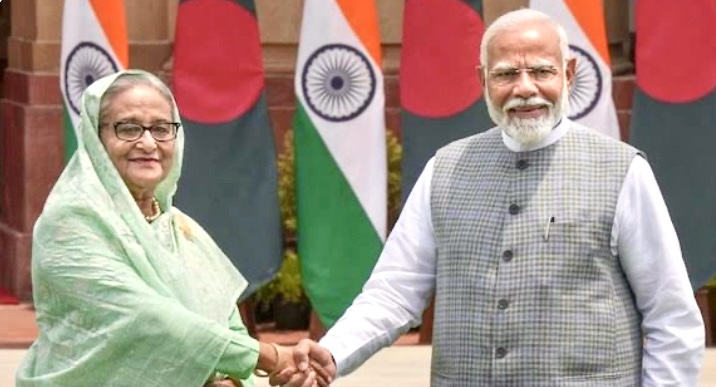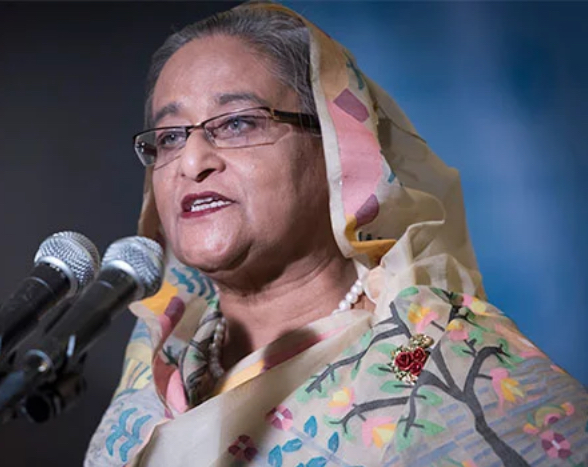Ousted Prime Minister of Bangladesh, Sheikh Hasina has landed at an Indian Air Force base on the outskirts of New Delhi. Facing an unprecedented chaotic situation, she resigned after ruling Bangladesh continuously since 2009. In the wake of massive national protests triggered by the controversial reservation policy for descendants of 1971 war veterans, She had to fled in an army chopper. The reservation policy faced fierce opposition from students and other segments of society, leading to widespread unrest and violent crackdowns by security forces. The mishandling of these protests, coupled with growing discontent over unemployment and economic struggles, has culminated in Hasina's ouster, marking a significant geopolitical shift in Indian subcontinent.
India's Closest Ally Departs
Sheikh Hasina's departure is a major concern for India, which has long considered her one of its closest geopolitical partners in the region. The loss of a trusted ally, coupled with the potential for a less cooperative regime, poses challenges for India's economic interests and regional security. New Delhi will closely monitor the unfolding situation in Dhaka, hoping for stability and a continuation of the strong bilateral ties that have characterized the Hasina era.

Under Hasina's leadership, Bangladesh maintained a stable and cooperative relationship with India, facilitating numerous economic, infrastructural, and counter-terrorism initiatives. The Awami League, Hasina's party, is broadly seen as pro-India, and her administration worked closely with New Delhi on ambitious connectivity projects, resolving contentious issues like territory and water-sharing, and fostering robust bilateral trade.
Economic and Strategic Investments at Risk
India's investments in Bangladesh under Hasina's regime have been substantial. With bilateral trade amounting to $13 billion in the financial year 2023-24, Bangladesh emerged as India's biggest partner in the subcontinent. Key exports from India to Bangladesh included cotton, petroleum products, and cereals, while readymade garments were a significant import from Bangladesh. Discussions on a Free Trade Agreement (FTA) were initiated in October 2023, aiming to further enhance trade and investment between the two nations.
Infrastructure projects, such as the recently inaugurated Akhaura-Agartala cross-border rail link and the Khulna-Mongla Port rail line, symbolize the growing connectivity between the two countries. These projects, supported by India's $8 billion lines of credit, have not only improved transportation and trade but also strengthened people-to-people ties.
Political Uncertainty and Strategic Concerns
The immediate future of Indo-Bangladesh relations is uncertain, with the Bangladesh Army forming an interim government. The Army Chief has called for calm and stability, but student groups leading the protests have already rejected military rule, indicating potential for further instability.

India's support for Hasina has not gone unnoticed, earning it some unpopularity among Bangladesh's opposition. The primary contender, the Bangladesh Nationalist Party (BNP), has historically had a troubled relationship with India, often aligning more closely with Pakistan and China. The BNP's previous reluctance to crack down on militant groups like ULFA and its alliances with Islamist groups are causes for concern in New Delhi.
Implications for Regional Connectivity
Disruptions in the Indo-Bangladesh relationship could have significant implications for regional connectivity. The Northeast of India, connected to the mainland only through the narrow “Chicken's Neck” corridor, relies heavily on Bangladesh for improved transportation routes. The operationalization of ports like Chittagong and Mongla for cargo movement is crucial for easing access to the Northeast.

Ram Kumar Kaushik is a seasoned journalist with over 25 years of experience across mediums. The architect of this news website, he is also a consultant with several media groups. He was formerly the group managing editor of ITV Network (NewsX, India News and The Sunday Guardian) and its digital products.



